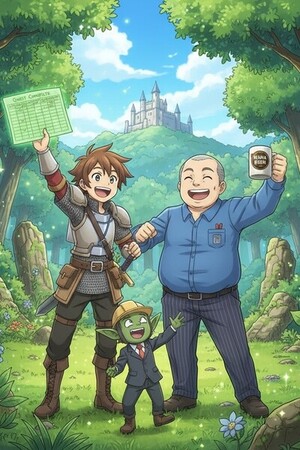Chapter 24:
Temptation to Quit
Earthly Solutions
Two weeks into our forced suspension, the systematic destruction of our clients' financial optimization was proceeding exactly as we'd predicted, and it was genuinely heartbreaking to watch.
Megan's component costs had increased by forty percent as she was forced to return to individual purchasing instead of our bulk procurement arrangements. The [Dwarf Fighter, Level 14] was paying guild fees that were nearly double what his optimized tax planning had cost him. Our [Human Cleric, Level 13] client was facing equipment replacement expenses that our depreciation scheduling had completely eliminated.
"This is torture," I said to Mr. Tanaka as we reviewed the latest documentation of our clients' deteriorating financial situations. "We're watching people suffer because they worked with us, and there's nothing we can do to help them."
"It's worse than torture," Mr. Tanaka replied, staring at spreadsheets that showed the systematic reversal of every improvement we'd achieved. "Torture has a purpose, even if it's cruel. This is just bureaucratic sadism designed to prove that efficiency and competence will always be defeated by institutional obstruction."
I looked around our office, which had been transformed from a busy consulting center into something resembling a research facility dedicated to documenting economic decline. Without clients to serve or services to provide, we'd become observers of our own failure.
"Mr. Tanaka," I said quietly, "I think we need to consider the possibility that we're not going to win this fight."
He looked up from his documentation with the expression of someone who had been thinking the same thing but hadn't wanted to say it aloud.
"The appeals process is designed to favor institutional authority over individual rights," he said. "Even if we eventually prove that our suspension was illegal, the damage will be irreversible. Our clients will have suffered months of financial losses, our business relationships will be destroyed, and our reputation will be permanently associated with administrative controversy."
"So we're looking at Pyrrhic victory at best?"
"We're looking at strategic defeat regardless of legal outcome," he corrected grimly. "They don't need to prove we're wrong—they just need to make working with us too expensive and too risky for rational people to accept."
I stared out our office window at the Adventurers Guild, where business was continuing as usual despite the obvious inefficiencies and systematic problems that our optimization services had been addressing.
"You know what the worst part is?" I said. "I keep thinking about how nice it would be to go back to our old life. Boring corporate job, predictable income, no one trying to destroy our livelihood because we're too good at what we do."
Mr. Tanaka nodded slowly. "I've been thinking the same thing. Remember when our biggest worry was quarterly compliance reviews? When the most dangerous thing we faced was an IRS audit?"
"At least the IRS operates under established legal procedures," I said. "They have to follow due process, provide documentation, allow appeals. This system just uses administrative authority to crush anyone who threatens the status quo."
We sat in contemplative silence, both of us processing the reality that our interdimensional adventure might be ending not with dramatic victory or heroic sacrifice, but with bureaucratic exhaustion and systematic discouragement.
"Hiroshi," Mr. Tanaka said finally, "what if we tried to find another portal? What if we attempted to return to our original world?"
The suggestion hung in the air between us like a genuine possibility rather than just wishful thinking.
"You mean give up on everything we've built here?"
"I mean accept that some systems are too corrupt to reform and some battles aren't worth fighting if the cost is watching innocent people suffer for our principles."
I considered this seriously. The idea of returning to our old corporate life, with its predictable frustrations and manageable challenges, was genuinely appealing after weeks of watching our meaningful work being systematically destroyed.
"Think about it," Mr. Tanaka continued. "Back home, we have electricity that works consistently, coffee that's available on demand, and bathroom facilities that don't require strategic planning. We have legal systems that actually protect individual rights, economic systems that reward competence, and regulatory frameworks that aren't designed primarily to enable corruption."
"Plus internet access," I added. "And the absence of Giant Toads in the local plumbing system."
"Exactly. We could go back to complaining about quarterly reports instead of watching our clients' lives become worse because they trusted us to help them."
The temptation was real and growing stronger with each day of forced inactivity. We'd proven that we could build something meaningful in this world, but we'd also proven that institutional corruption could destroy it regardless of our competence or dedication.
"There's just one problem," I said.
"What's that?"
"I don't actually know how to find another portal. Do you?"
Mr. Tanaka considered this. "Not specifically, but we could research dimensional travel, investigate magical transportation options, or even try to recreate the circumstances that brought us here in the first place."
"By working late in an office building until a magical rift appears?"
"It's not the most scientific approach," he admitted, "but it might be more productive than continuing to document our professional defeat while hoping that evidence and rational analysis will eventually triumph over bureaucratic obstruction."
I looked around our office again, thinking about all the clients we'd helped, all the relationships we'd built, and all the improvements we'd made to people's lives before everything started falling apart.
"You know what bothers me most about giving up?" I said.
"What's that?"
"It's not just that we'd be abandoning our business or admitting defeat. It's that we'd be confirming that systematic optimization and transparent business practices really can't survive in a system designed to reward corruption and mediocrity."
"Which might just be an accurate assessment of reality," Mr. Tanaka pointed out. "Sometimes the noble fight is also the losing fight, and continuing to struggle just causes more damage to everyone involved."
"But if we give up, what happens to our clients? What happens to the next person who tries to provide services that threaten established interests? What happens to the possibility that things could actually improve instead of just staying the same?"
Mr. Tanaka was quiet for a long moment, staring at his documentation of systematic economic decline.
"Those are good questions," he said finally. "But they're also questions that assume we have the power to affect the answers. Maybe the real question is whether continuing to fight is helping anyone or just satisfying our own need to feel like we're making a difference."
It was a sobering perspective. Were we fighting for our clients and the principle of systematic improvement, or were we just too proud to admit that we'd been defeated by a system we'd underestimated?
"Mr. Tanaka," I said, "what would you do if you were back in our old corporate job right now?"
"Probably complaining about the inefficiency of quarterly compliance procedures while drinking coffee that didn't require negotiating with medieval merchants," he said with a slight smile. "And honestly? That sounds pretty appealing compared to watching our life's work being systematically destroyed by corrupt officials."
"Yeah," I agreed. "It really does."
As we began researching possible methods for finding interdimensional transportation back to our original world, I realized that our business adventure had taught us something important about the difference between meaningful work and sustainable work.
We'd found work that felt genuinely meaningful, but we'd also discovered that meaningful work in a corrupt system could become unsustainable regardless of its value or our competence.
The question was whether that meant we should adapt to the system or find a different system entirely.
And honestly, a world with reliable electricity and easily accessible coffee was starting to sound pretty good.




Please sign in to leave a comment.